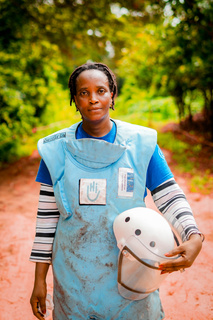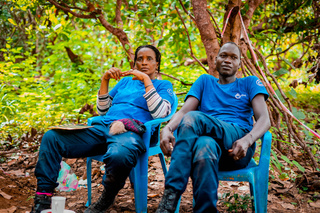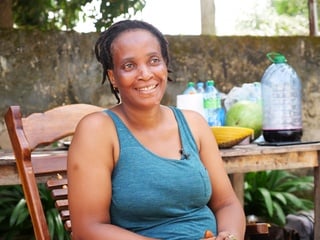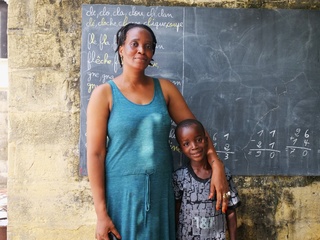A deminer: my family is proud of me
 When you live in Casamance, the threat of mines is everywhere. When I was a child, I witnessed two accidents that left a deep impression on me. On the first occasion, the victim was a family friend, a prawn seller who came to the house every morning. One day, five minutes after he left, we heard an explosion. It was an anti-tank mine. I saw his lifeless body being carried away a little while later. Can you imagine? Someone you know is killed just minutes after talking to you.
When you live in Casamance, the threat of mines is everywhere. When I was a child, I witnessed two accidents that left a deep impression on me. On the first occasion, the victim was a family friend, a prawn seller who came to the house every morning. One day, five minutes after he left, we heard an explosion. It was an anti-tank mine. I saw his lifeless body being carried away a little while later. Can you imagine? Someone you know is killed just minutes after talking to you.
The second explosion happened when I was on my way to the rice fields with a group of friends. It was market day and a bus drove past us. Twenty metres further on, there was an explosion caused by an anti-personnel mine. Fortunately, the explosion only caused minor burns among my friends... Everyone here has had similar experiences. So, you know, nobody in my family asks me to stop doing this job.
“It's a source of pride for everyone that one of us is working to clear our land.”
A deminer’s day: part joy, part fear
Demining was my first job and I didn't know what it involved at first. When I was a student, my grandmother ran a snack bar where Humanity & Inclusion (HI) teams used to eat. She heard that the organisation was recruiting deminers. I applied three times before I was accepted. HI’s training course lasted four weeks and was part theory and part practice.
The most dangerous thing about demining is when you don’t find anything, because then you can start to think that there's nothing there. But it's been said that a deminer's first mistake is also their last. The most important thing is never to let your guard down, to stay focused. That's why we need morning briefings, with reminders of the safety rules. And that's why we have supervisors and team leaders, who go round the sites to check that procedures are being followed.
"I found my first mine in 2023. I was shaking like a leaf! Because in demining, you experience joy and fear at the same time. After that, one thing led to another and I discovered other mines. The last one was just a few days ago. The area we're working in at the moment is a dangerous one, with new mines being discovered all the time.”
Solidarity within the team is essential to everybody’s safety. At HI, we don’t look at age or experience; there's a lot of respect between us. When we find a mine, it's a shared victory.
 When I make a discovery, as a level 2 deminer, I'm able to identify the device. Once I've identified it, I retrace my steps, close the corridor and call the team leader. He informs his superior, the head of operations, who in turn informs the community liaison officers. They alert the villagers. Then all the deminers withdraw to the rest area. If the device cannot be removed, we destroy it on site.We knew from the outset that the work would be difficult, and that's something we accept. I don't regret becoming a deminer; it's a joy to work here. I'm never discouraged. I'm really proud to be part of this HI demining team. I've found a second family.
When I make a discovery, as a level 2 deminer, I'm able to identify the device. Once I've identified it, I retrace my steps, close the corridor and call the team leader. He informs his superior, the head of operations, who in turn informs the community liaison officers. They alert the villagers. Then all the deminers withdraw to the rest area. If the device cannot be removed, we destroy it on site.We knew from the outset that the work would be difficult, and that's something we accept. I don't regret becoming a deminer; it's a joy to work here. I'm never discouraged. I'm really proud to be part of this HI demining team. I've found a second family.
"With the weight of the protective gear, the sun and the visor, it's hard, but there's also a lot of joy. Because you're clearing land and saving lives. You’re enabling people to return home and work their land. I'm really proud, as a Senegalese and as a Casamance woman, to be clearing this land and allowing people to return to it."
Life after demining
 Of course, it's a job that demands a lot of time and investment. We don't go home every night. Sometimes we're out in the field for three weeks, and that's difficult, it's true, but you make adjustments and you get used to it.
Of course, it's a job that demands a lot of time and investment. We don't go home every night. Sometimes we're out in the field for three weeks, and that's difficult, it's true, but you make adjustments and you get used to it.
“Sometimes my children call the head of operations and ask: "When's my mum coming home?” We keep in touch by phone. It's a bit difficult, but we deal with it.”
When I started in 2010, I already had two boys. I've had two more since then, in 2011 and 2015. To reconcile my family life and my job as a deminer, the most important thing has been finding time to spend with my husband. I've also found a household help who lives with us for 4 months and I've hired a home tutor for the children. Today, only the youngest lives with me. My other three boys are in the village with my brothers, who look after them and bring them up.
 "Being a deminer also means preparing for the near future. I know that sooner or later mine clearance in Casamance will come to an end. In fact, that's what everyone in Casamance is praying for - we can't go on living with these things. So every deminer must be prepared to do something other than demining in the future."
"Being a deminer also means preparing for the near future. I know that sooner or later mine clearance in Casamance will come to an end. In fact, that's what everyone in Casamance is praying for - we can't go on living with these things. So every deminer must be prepared to do something other than demining in the future."
The demining world is a small one and not everyone will be able to go and clear mines in other countries once the work is done here. If you can't go elsewhere, you have to stay at home and do something different. I've started a fish-selling business on the side and I'm saving money to build a home for my family and me.
Senegal estimates the extent of contamination linked to the conflict in Casamance at 1,200,000 m² of land, spread over five departments. In May 2022, HI relaunched its demining operations in Casamance, where the organisation had already cleared more than 900,000 m² of land since 1996. HI's current two projects will clear 800,000 m² of land by 2025, helping to restore security and socio-economic prosperity to communities in the Ziguinchor and Sédhiou regions.


 When you live in Casamance, the threat of mines is everywhere. When I was a child, I witnessed two accidents that left a deep impression on me. On the first occasion, the victim was a family friend, a prawn seller who came to the house every morning. One day, five minutes after he left, we heard an explosion. It was an anti-tank mine. I saw his lifeless body being carried away a little while later. Can you imagine? Someone you know is killed just minutes after talking to you.
When you live in Casamance, the threat of mines is everywhere. When I was a child, I witnessed two accidents that left a deep impression on me. On the first occasion, the victim was a family friend, a prawn seller who came to the house every morning. One day, five minutes after he left, we heard an explosion. It was an anti-tank mine. I saw his lifeless body being carried away a little while later. Can you imagine? Someone you know is killed just minutes after talking to you. When I make a discovery, as a level 2 deminer, I'm able to identify the device. Once I've identified it, I retrace my steps, close the corridor and call the team leader. He informs his superior, the head of operations, who in turn informs the community liaison officers. They alert the villagers. Then all the deminers withdraw to the rest area. If the device cannot be removed, we destroy it on site.We knew from the outset that the work would be difficult, and that's something we accept. I don't regret becoming a deminer; it's a joy to work here. I'm never discouraged. I'm really proud to be part of this HI demining team. I've found a second family.
When I make a discovery, as a level 2 deminer, I'm able to identify the device. Once I've identified it, I retrace my steps, close the corridor and call the team leader. He informs his superior, the head of operations, who in turn informs the community liaison officers. They alert the villagers. Then all the deminers withdraw to the rest area. If the device cannot be removed, we destroy it on site.We knew from the outset that the work would be difficult, and that's something we accept. I don't regret becoming a deminer; it's a joy to work here. I'm never discouraged. I'm really proud to be part of this HI demining team. I've found a second family. Of course, it's a job that demands a lot of time and investment. We don't go home every night. Sometimes we're out in the field for three weeks, and that's difficult, it's true, but you make adjustments and you get used to it.
Of course, it's a job that demands a lot of time and investment. We don't go home every night. Sometimes we're out in the field for three weeks, and that's difficult, it's true, but you make adjustments and you get used to it.  "Being a deminer also means preparing for the near future. I know that sooner or later mine clearance in Casamance will come to an end. In fact, that's what everyone in Casamance is praying for - we can't go on living with these things. So every deminer must be prepared to do something other than demining in the future."
"Being a deminer also means preparing for the near future. I know that sooner or later mine clearance in Casamance will come to an end. In fact, that's what everyone in Casamance is praying for - we can't go on living with these things. So every deminer must be prepared to do something other than demining in the future."

